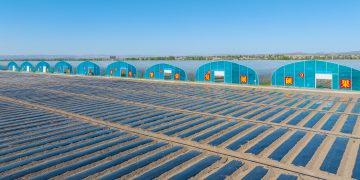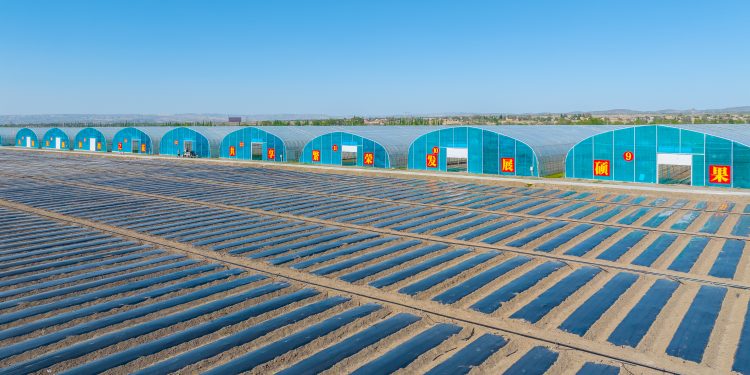The spring months of April and May mark the critical period for vegetable planting in Guyuan, where huge tracts of land are devoted to both field and farming. In the Yuanzhou area, the production of distinctive local brands of broccoli, Xiji celery and Pengyang peppers is rapidly expanding. Farmers and businesses are optimistic about a profitable season as more than 400,000 acres of outdoor vegetables and more than 60,000 acres of plant-grown vegetables prepare for sale. In a normal year, Guyuan’s 500,000 acres of cold-climate vegetables produce a yield of more than 2 million tons and an industrial value of more than 4.5 billion yuan.
Miao Jili, a vegetable farmer from Mayuan Village in Yuanzhou County, vividly recalls the revolutionary impact of Shandong’s Shouguang greenhouse technology more than two decades ago. This innovation changed local farming practices, pushing farmers toward rapid development. Currently, Guyuan boasts 63,500 acres of farm-grown vegetables, producing 300,000 tons of vegetables annually. This includes approximately 7,000 solar greenhouses covering 20,000 acres and more than 40,000 medium and large plastic tunnels covering more than 40,000 acres. These facilities extend the growing season and increase production efficiency, producing about 5 tons of vegetables per acre for crops such as tomatoes, cucumbers, peppers and eggplants.
Longde County, despite its small size, has thriving vegetable farms, especially in the Yuhe River basin, which cover more than 20,000 acres, the highest in the region. Wang Zhengjun, head of a vegetable base in Kuangping Village, Honghe City, Pengyang County, is looking forward to the first batch of Chinese broccoli hitting the market in just over ten days. This 1,000-acre farm is equipped with storage and pre-cooling processing equipment, ensuring freshly harvested vegetables are packaged and delivered to regions such as Guangdong, Hong Kong and Macau within 24 hours. Chinese Guyuan broccoli has become a popular choice on coastal tables, and large-scale continuous planting is expected to soon produce a bountiful harvest.
Extensive rotation and sequential planting of outdoor vegetables across more than 400,000 acres will continue through August and September, resulting in approximately 1.7 million tons of production. Major crops include celery, cabbage, peppers, Chinese broccoli, broccoli and bok choy, each covering between 30,000 and 70,000 acres, creating significant economies of scale.
Guyuan also excels in supporting infrastructure, including 41 intelligent and high-quality seedling nurseries with an annual capacity of 800 million seedlings, 57 cold storage warehouses with a single-cycle capacity of 72,000 tons, and 61 large-scale trading organizations, forming a reliable and growing company. production chain.
With the advantages of cool climate, clean air and advanced smart greenhouse technology, Guyuan’s cold climate vegetables are in great demand throughout the country. They mainly supply summer vegetables to markets in Northern, Central, Southern and Southwest China, with some exports going to Malaysia, the UAE and Saudi Arabia. Recognized as the “Cold Climate Vegetable Capital of Western China” by Yuanzhou District, the “Celery Capital of China” by Xiji District, and the “Pepper Capital of China” by Pengyang District, Guyuan’s cold climate vegetables have even received EU certification, guaranteeing them access to the global market .
Guyuan’s agricultural sector has achieved significant growth through innovation and large-scale cultivation of cold-climate vegetables. The region’s success story highlights the importance of technological advances and strategic market positioning in modern agriculture. As demand continues to grow, Guyuan is well positioned to become a leader in sustainable and profitable vegetable farming.































